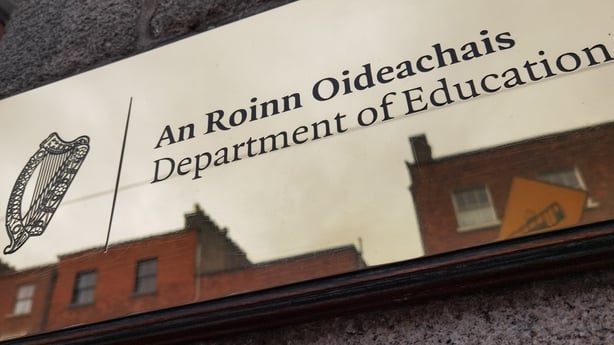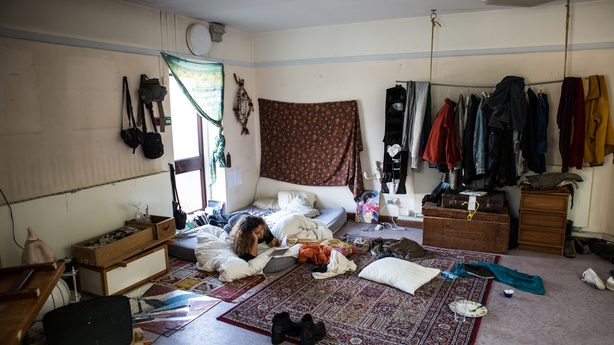In the corner of an almost empty classroom, a fold-out sofa bed is pushed against a wall. Apart from a blackboard, there are few signs of the hundreds of students once educated in St Joseph's School in New Ross, Co Wexford.
Instead there’s a small leather couch, a coffee table, and a locker. Property firm Monoma Ireland describes the classroom as a "fantastic studio-type room".
Last week, an ad appeared on both Daft.ie and Monoma’s website offering tenants an opportunity to live in the former primary school for €275 a month.
The company offers a "protection by occupation" service, where renters, known as property guardians, live in vacant buildings at a reduced rate to prevent vandalism and disrepair.
When the ad was highlighted on the Crazy House Prices Instagram account, the reaction was swift. Wexford County Council confirmed to Prime Time that it sent warning letters relating to "the possible unauthorised use" of the school to the building’s owners, the Mercy Sisters and to Monoma Ireland.
However, it has emerged that the Sisters are to proceed with plans to "secure" the empty building using the services of the property company.
In a statement issued to the programme, the Mercy Sisters, Southern Province, said their preferred opinion is to dispose of the building, but the Department of Education retains a hold on it.

"The Department wish to retain this ongoing hold on the property for the present, which greatly restricts our current options," it said.
The Sisters said they have a responsibility to secure the property and that it will be fitted with temporary bathroom and kitchen facilities fulfilling "all requirements regarding health and safety".
"Our main concern is the security of the property and its inevitable deterioration, as it is not in use or occupied," it said.
The congregation will not be receiving any financial payment, the Sisters added.
Wexford County Council told Prime Time that it will carry out inspections to ensure compliance with relevant planning legislation.
Local councillor Michael Sheehan, who has previously run a food bank from the empty school building, called on the congregation to "do the honourable thing by the people of New Ross" and develop it as an enterprise centre.
"It is not a building for housing – it’s a building for enterprise."
Monoma Ireland has taken down the original ads for St Joseph’s ahead of further discussion "on what security solution is needed". The company, formerly known as Camelot Property Management Ireland, told Prime Time that its tenancy model protects vacant premises from dilapidation and vandalism.
"We find the right people, match them with temporary vacant housing and support them in making a vacant property into part of a community while they live there temporarily whilst the property owners decide on the next steps for the property."
Earlier this week, Monoma Ireland also advertised tenancies in a former nursing home, where unfurnished rooms were available for €300 a month.

While so-called "property guardians" aren’t unheard of in Ireland, they usually live in residential properties that are empty for short periods of time.
On its website, the company describes its tenants as "modern nomads" who "prefer a flexible lifestyle and appreciate creative use of space".
The property guardian system has existed in Ireland for a number of years but, up to now, tenants have mostly lived in residential properties which are empty for short periods of time rather than former schools or nursing homes.
In the UK, the model is far more common. Up to 7,000 people occupy empty council offices, commercial buildings and healthcare settings at a reduced rent.
Sean, who is originally from Ireland, lives as a property guardian in a former NHS care home in Lambeth in London. He lives with 40 other people across four wings of the facility and pays £525 in rent a month, including most bills.
"It’s set up a lot like university halls. Our wing has eight people sharing a large garden, three bathrooms, a big kitchen and a living room," he told Prime Time.
The building will eventually be a high-rise apartment block. However, while the developer goes through the planning process, Sean is able to live in a central part of one of Europe’s most expensive cities.
But the model has significant downsides. Tenants sign licences, not leases, so there is very little security of tenure.
"You can be kicked out with a month's notice," Sean said.
Britain’s Department of Housing is cautious about the system. It advises that it does not "endorse or encourage" the property guardian model.
"Guardians can be asked to live in conditions that do not meet the standards expected in residential properties, but people have the right to make their own informed decisions about their housing choices," its website says.

It’s a concern shared by Irish housing charity Threshold, which says the licences that tenants sign as property guardians provide few, if any, rights and lack "basic security of tenure."
"The use of such agreements, while appropriate in limited circumstances, risk exposing the most vulnerable to housing insecurity."
Acknowledging that repurposing empty buildings can often be a quick way to provide housing, the charity insists that buildings must be adapted in line with the relevant regulations to ensure suitability and quality.
Despite the insecurity, some tenants desperate for affordable rent will undoubtedly be interested in becoming a property guardian. Average rents in New Ross are at least three times the €275 advertised at St Joseph’s school.
Monoma said their business model makes "a small, but effective contribution to the challenges on the Irish housing market and maintaining lively neighbourhoods."
But in London, Sean who lives in an NHS care home believes property guardianship is only attractive because "it exists in a market that is already broken".
"It isn’t a long term solution," he said, "to a lack of affordable housing."







